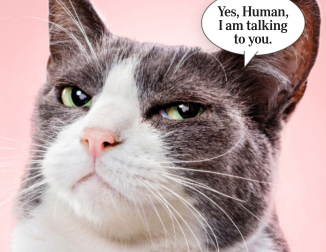19 Purring doesn't always mean I'm happy. Cats also purr if they're sick or injured.
呼嚕聲并不總是意味著貓是開(kāi)心的。貓?jiān)谏』蛘呤軅麜r(shí)也會(huì)有呼嚕聲。
They're essentially saying they need your help or want you to stay nearby for comfort.
它們是在說(shuō),它們需要你的幫助,或者需要你待在附近安慰它。
Another theory is that the action of purring is physically healing for cats.
另一個(gè)理論表示,貓打呼嚕意味著它正在身體治療。
Gary Weitzman, a veterinarian and CEO of the San Diego Humane Society,
獸醫(yī)加里·韋茨曼是圣地亞哥動(dòng)物保護(hù)協(xié)會(huì)的首席執(zhí)行官,
told the BBC that the frequency of a cat's purr is similar to the frequencies of vibrations associated with bone and tissue healing.
他告訴BBC,貓打呼嚕的頻率與骨骼和組織愈合相關(guān)的振動(dòng)的頻率是相似的。
20 My purring might help you too. The frequencies of a cat's purr may confer health benefits on nearby humans as well.
貓的呼嚕聲也能幫助人類。貓的呼嚕聲也可能對(duì)身邊的人帶來(lái)健康益處。
"It calms us and pleases us, like watching waves against a beach," Dr.Weitzman told the BBC.
“它使我們平靜和愉悅,就像浪打在海灘上,”韋茨曼告訴BBC。
"We respond to a cat's purr as a calming stimulus and may have even genetically selected cats with more propensity to purr."
“貓的呼嚕聲對(duì)我們來(lái)說(shuō)是一種鎮(zhèn)靜刺激,甚至從遺傳學(xué)角度來(lái)說(shuō),我們就更喜歡選擇有更多呼嚕傾向的貓。”
21 I care what you think. For a study in Animal Cognition in 2015,
我在意你的感覺(jué)。在2015年的一個(gè)動(dòng)物認(rèn)知實(shí)驗(yàn)中,
researchers set up an unfamiliar and slightly scary scenario (if you are a cat)—an electric fan with ribbons attached.
研究人員設(shè)置了一個(gè)不熟悉的、有點(diǎn)嚇人的場(chǎng)景(如果你是一只貓)——一個(gè)綁著帶子的電扇。
When cats entered the room with their owners, 79 percent looked back and forth between their person and the fan,
當(dāng)貓與其主人進(jìn)到房間里時(shí),79%的貓來(lái)回看著他們的主人和電扇,
indicating that they were trying to see whether the human was afraid.
這表明,他們?cè)噲D確定人類是否害怕了。
Half the owners were told to act confident and approach the fan, and the other half were told to act nervous and move away from it.
研究人員讓一半的主人表現(xiàn)出自信,接近電扇,另一半則要表現(xiàn)出緊張,遠(yuǎn)離電扇。
The cats whose people seemed scared were significantly more likely to direct their gaze to the room's exit.
那些表現(xiàn)出害怕的人們的貓更有可能將目光投向房間的出口。
22 But I still might treat you as if you're not there.
但是我還是會(huì)把你當(dāng)外人看待。
Japanese researchers found in a recent study that cats recognize their own names.
日本研究人員在最近的一項(xiàng)研究中發(fā)現(xiàn),貓能夠識(shí)別他們自己的名字。
Regardless of who was speaking, most cats reacted in the same way,
研究人員表示,當(dāng)貓的名字被叫到時(shí),不管是誰(shuí)在說(shuō)話,大多數(shù)貓的反應(yīng)是一樣的,
moving their heads or perking up their ears when their names were spoken, the researchers wrote.
轉(zhuǎn)動(dòng)他們的頭,或者豎起他們的耳朵。
So if Fluffy isn't coming when you call? Yup, she's probably just ignoring you.
當(dāng)你叫路威的時(shí)候,她沒(méi)有過(guò)來(lái)?她可能就是在忽略你。

23 I hold a grudge. Your feline friend not only remembers the sound of the can opener and the jingle of his favorite toy;
我會(huì)記仇。你的貓科朋友不僅會(huì)記得開(kāi)瓶器的聲音,還有他最喜歡的玩具的鈴聲,
he also remembers who sprayed him with a water pistol to get him off the dinner table.
他也記得誰(shuí)朝他滋水槍,讓他從晚餐桌上下去。
"Cats don't forgive, and once they realize a person is causing them anxiety or hurt, they keep away," Bradshaw says.
布拉德肖說(shuō):“貓是不會(huì)原諒的,一旦他們意識(shí)到某人給他們帶來(lái)焦慮或者受傷的話,他們會(huì)遠(yuǎn)離這個(gè)人。”
24 I'm not trying to make you mad. Cats are stretching, flexing, removing dead cells from their claws,
我不是要惹你生氣。根據(jù)動(dòng)物保護(hù)協(xié)會(huì)的說(shuō)法,貓?jiān)诩揖呱现圃靹澓蹠r(shí),
and marking territory when they scratch furniture, according to the Humane Society.
貓是在伸展,屈伸,從爪子上去除死細(xì)胞,還有標(biāo)記領(lǐng)地。
There is also a reason behind their spraying—unlike us, they find the scent comforting, and they spray to feel more secure in a stressful situation.
它們噴灑小便也是有原因的——不像我們,它們覺(jué)得氣味很舒服,它們?cè)诰o張的情況下噴灑是為了感到更安全。
"Cats are control freaks," Cathy Lund, a feline-only veterinarian in Providence, Rhode Island, told petmd.com. "They like to feel in charge."
凱茜·倫德是羅得島州普羅維登斯的貓科獸醫(yī)。她告訴petmd.com,“貓都是控制狂,他們喜歡掌控一切的感覺(jué)。”



